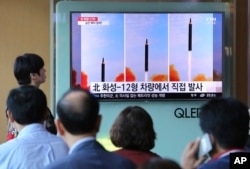The United Nation special rapporteur for human rights in North Korea warned Thursday international sanctions could be unintentionally hurting human rights in the country.
"I am concerned with the possibility that these sanctions might have a negative impact on vital economic sectors, and therefore, a direct consequence on the enjoyment of human rights," Tomas Ojea Quintana told a U.N. human rights committee.
Quintana, who was delivering his annual report on the state of human rights in North Korea, said he was looking at the issue in the context of the heightened tensions on the Korean peninsula.
He urged a comprehensive review of sanctions imposed on the regime to avoid what could be collective punishment of ordinary North Koreans.
Pyongyang faces new sanctions
The U.N. Security Council has adopted two rounds of increasingly tougher sanctions on Pyongyang in response to its September nuclear test of a possible hydrogen bomb and its repeated ballistic missile launches.
The sanctions aim to cut off funding to the regime's illicit nuclear program. They include export bans on several sectors including oil, coal, iron, textiles, seafood and banking, while limiting the number of North Koreans who can work abroad to generate money for the government.
"It was brought to my attention that the sanctions implemented by the Security Council may have prevented access to chemotherapeutic medicine for cancer patients and other medical supplies," the rights expert said. "The shipment of wheelchairs and essential equipment for persons with disabilities may have also been constrained."
Quintana said humanitarians are also facing difficulties in sourcing vital supplies and in carrying out financial transactions.
'Serious impediment'
Quintana noted that the recent surge in sanctions has "been a serious impediment to an open human rights dialogue." He added that isolating North Korea internationally would not help improve the human rights situation.
The special rapporteur also noted Thursday that no North Korean representative attended his presentation to the committee.
North Korea rejects his Human Rights Council mandate and has repeatedly denied his requests to visit the country. Quintana gathers much of his information from defectors and others in South Korea and Japan.
His report highlighted the continued widespread and grave violations of human rights that experts have been chronicling for many years. Life can be bleak in North Korea, where abuses include torture and ill-treatment of prisoners, restrictions on freedom of movement inside and outside the country, strict government controls on access to information, chronic food insecurity, persistent discrimination against women and the trafficking of women and girls into China.





